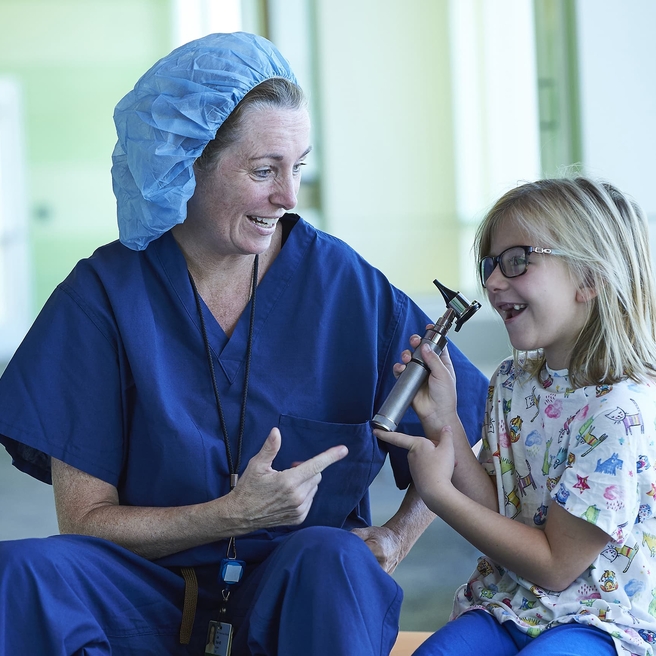What is Meniere's disease?
Meniere’s disease is a common cause of vertigo in adults, but is rarely seen in children. It typically presents with severe vertigo lasting 20 minutes to 24 hours, fluctuating hearing loss, and fullness or pressure of the ear. Children may also experience imbalance, ringing in the ears, and nausea and vomiting. In most cases, only one ear is affected. The hearing loss associated with Meniere’s is usually progressive hearing loss that can become permanent.
Causes of Meniere's disease
The cause of Meniere’s disease is unknown. In the leading theory, it is believed to result from an abnormal fluid buildup in the inner ear. It is thought there is excess production or improper drainage of the fluid in the inner ear. It is speculated that this could be caused by an immune response, allergies, infections, head trauma, migraines, stress, certain foods, or pressure changes. It is also believed that Meniere’s disease is genetically linked.
Diagnosing Meniere's disease
Your primary care provider will likely refer your child to a pediatric otolaryngologist (ENT specialist) because diagnosing the cause of vertigo can be challenging. Meniere ’s disease must be differentiated from other forms of dizziness, and a thorough evaluation of all possible causes may be necessary. A multidisciplinary team of otolaryngologists, audiologists, and physical therapists is best able to perform the comprehensive evaluation and to know when to call on the expertise of other specialists.
The otolaryngology evaluation will include:
- Extensive medical history-taking with questions for both you and your child
- Thorough physical exam, especially of the head and ears
- Vestibular exam to evaluate their balance and inner ear function
During the course of the evaluation, you will meet with a vestibular trained audiologist for an evaluation and further testing. This evaluation may include:
- Audiologic evaluation (hearing test)
- Rotational chair testing, which involves your child sitting in a computerized rotating chair, safely secured with a seatbelt, and wearing light weight goggles. During this test, your child’s eye movements will be recorded as the chair gently moves.
- Videonystagmography (VNG), which involves your child wearing lightweight goggles that have tiny cameras to record eye movements. During the test, your child will be asked to look at a series of objects and their eye movements will be recorded. In another part of the test, warm and cool air or warm and cool water will be placed in your child’s ear canal and their eye movements will be recorded.
- Vestibular Evoked Myogenic Potential (VEMP), which involves gently placing electrode stickers on your child’s forehead, neck, and eyes. Small earphones will also be placed in their ear. The earphones will send clicking sounds to their ear and your child’s body response to the clicking sound will be measured in the electrode stickers.
- Video head impulse test (vHIT), in which your child will wear lightweight goggles that measure eye movements. During the test the audiologist will quickly turn your child’s head and their eye movements will be recorded.
During the course of the evaluation, you will meet with a vestibular trained physical therapist for an evaluation and they may perform tests such as:
- Evaluation of gross motor skills, such as hopping, skipping and jumping with eyes open and closed.
- Dynamic Visual Acuity, which involves testing your child’s vision while your child is shaking their head.
- Posturography, which involves your child will wearing a safety harness and standing on a moving platform to evaluate balance.
Referrals to other specialist may be considered, as well as:
- Lab (blood) tests
- Imaging tests, such as CT scan or MRI
Treatment for Meniere's disease
There is currently no cure for Meniere’s disease. Treatment is focused on reducing triggers. Medications may be prescribed if necessary, as well as dietary modifications. Surgical options may be considered for severe cases.
Why choose CHOP?
The Balance and Vestibular Program at Children's Hospital of Philadelphia is a multidisciplinary program that specializes in the evaluation and treatment of children with dizziness and balance disorders. Our program is dedicated to leading the way in the advancement in diagnosis and treatment of pediatric vestibular disorders. Our team is comprised of experts and uses state of the art vestibular testing technology. We work closely with families and referring physicians to better understand a child’s symptoms and create a customized care plan.
Resources to help
Reviewed by Erin W. Field, MMS, PA-C
